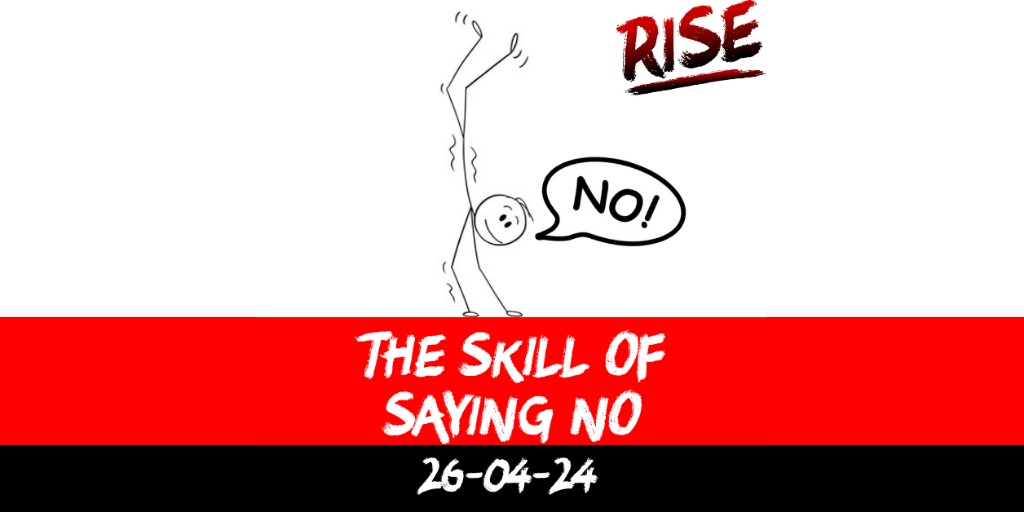In yesterday’s blog, I talked about the mindset behind us saying “no” to things that we have, perhaps, struggled to say no to before.
And I mentioned that today I’ll cover the skill set of saying no.
Because it’s a skillset that we perhaps don’t realise exists.
It seems obvious what to do.
The opposite of the Nike slogan.
“Just say no”
But below, I’m going to cover a number of ways to say no, that we might not have considered.
And what I’d like at the end is for you is for you to have developed a clear ‘implementation intention’.
“When X happens, I will Y”
Because a clearly defined plan of how to say no in the most effective way coupled with an increased desire to say no…….
Make that no much more likely.
So here’s some considerations in how best to say no in different situations;
1. Make it so it’s hard to say yes.
Filling our lives with high value, important activities that motivate and enthuse us means there is less room for low value stuff that others might try to impose on us.
2. Reply with ‘policy’ not ‘problem’
If we give a reason that we can’t say yes, that can often feel like a problem for them to help solve.
A negotiation to be had.
A flat “I don’t……..” Can be much more powerful in certain situations.
“I don’t work weekends”
“I don’t work past 6pm”
“I don’t drink in the week”
“I don’t have desserts when eating out”
“I don’t have cake and biscuits at work”
“I don’t do 1:1 calls”
3. Create a hoop for them to jump through
Pass it back to them with a thing that either they’re unlikely to do or something that, if they do it, will make the situation easier for you.
“Yeah no problem – send me an email or a text and we’ll sort it”
“That’s cool. I don’t charge for that but do ask for a donation of £X to a RELEVANT CHARITY. Here’s the link……..”
“No problem. Get that set up with my assistant”
“That’s fine, here’s a link to get that booked in”
“You come to me and we’ll do that”
“You buy the first bit and I’ll sort the rest”
4. Include who else would get a ‘no’ if you said ‘yes’ here
“I’d love to be able to do that but it’d mean my kids couldn’t do their sports”
“I don’t do deals because it’d be unfair on all my other clients”
“If I took on this account, I’d have less time for the XYZ account”
“If I got drunk then, I wouldn’t be able to do ABC with the family the next day”
If I help you, I’d be letting down…………
5. Ask them what they think your should ‘de-prioritise’
“I’d love to take on that job, but I’d have to de-prioritise the X job or Y job. Which do you think I should choose?”
“That’s cool. I’d have to free up 5 hours from my other work – where do you think makes the most sense?”
“If I do X, I won’t be able to Y or Z as much. What would you do?”
6. Offer a ‘downsell’
If you can’t do that thing, reply with what you can / are willing to do.
“I can’t do five hours, but I can do one”
“I can’t come out this Friday but I can meet for a coffee next Tuesday”
“I don’t work weekends but I can stay later on a Monday”
“I can’t do a full training but I could do a mini one or a Q&A”
7. Pre-empt the no
Don’t just wait until asked.
Let the people who might ask know that you don’t do XYZ, what would need to change if you were to, etc.
So, based on the above, what’s your ‘implementation intention?
“When X happens I will Y”
What’s the thing you want to say no to and how will you say no (whether to others or yourself) when that happens?
Again, actually written down makes it infinitely more likely to happen 🙂
Much love,
Jon ‘and match’ Hall
P.S. Every time you scroll past this link, you’re saying “no” to increasing your energy and mood and changing your body to one you like the look and feel of more –> www.myrise.co.uk/apply
——————————————————————-
RISE in Macclesfield was established in 2012 and specialise in Group Personal Training weight loss programmes for those that don’t like the gym and find diets boring and restrictive!
